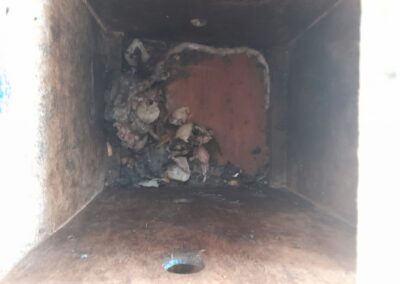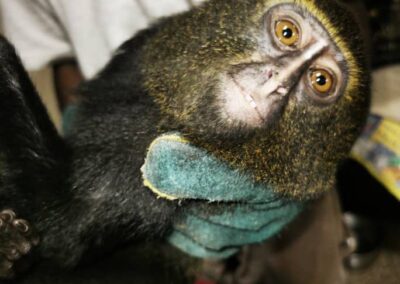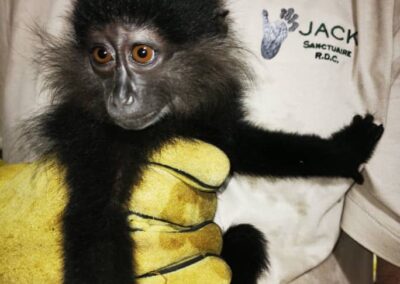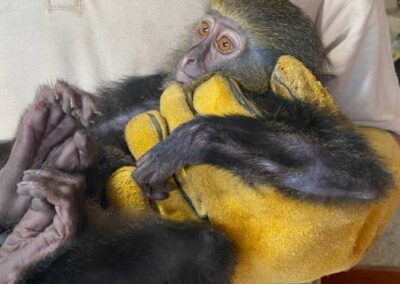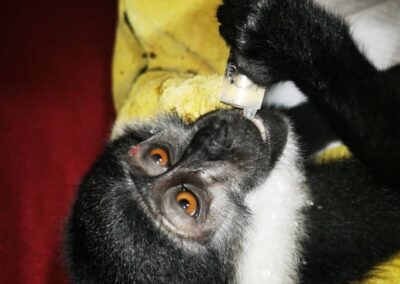Largest Seizure of Monkeys in Africa Welcomed to J.A.C.K. Sanctuary in the Democratic Republic of Congo
Trafficking of African primates from Africa to Asia was thwarted with confiscated animals repatriated and sent to accredited PASA member sanctuary
December 28, 2023 – A few days before the year 2023 comes to an end and shortly before Christmas, a PASA* member sanctuary in the southern Democratic Republic of Congo (DRC), J.A.C.K., welcomed the arrival of rescued monkeys seized in Togo. The animals were confiscated from an enforcement operation earlier this month in West Africa when Togo authorities in collaboration with wildlife investigation organization EAGLE Network intercepted 40 monkeys illegally trafficked from DRC and destined for Thailand. It was the largest international seizure of monkeys in Africa. Two monkeys were found dead in their crate by the enforcement officers in Togo. On December 22nd, the surviving monkeys were welcomed to J.A.C.K. Sanctuary in Lubumbashi, DRC.
This is the second large-scale international primate rescue of J.A.C.K in recent years. Two years ago, J.A.C.K. received 23 monkeys that were smuggled from DRC and intercepted in Zimbabwe following a wildlife enforcement operation and joint repatriation effort between the Zimbabwean and DRC governments, local conservation organizations, and PASA. Currently, J.A.C.K. is caring for more than 80 monkeys of various species that have been rescued from the domestic and international illegal trade.
Co-founder and president of J.A.C.K. Franck Chantereau said, “We appreciate the collaboration between the Togo and DRC governments who promptly repatriated the animals within days upon their seizure. It was like a Christmas miracle for these vulnerable monkeys, some as young as four months old, that have found a safe haven at our sanctuary right before the holiday season. The sudden influx of such a large number of animal arrivals is a challenging task for us, but when so many lives are at stake and depend on us, we must do all that we can to bring wildlife criminals to justice and provide high quality care for the rescued animals.”
Chantereau continued, “We are grateful for the support from organizations and individual donors who help us through this difficult time, juggling between building new enclosures and administering urgent medical care for these newly rescued animals. While the enforcement operation has successfully concluded, the hard work has just begun when our sole mission is to nurse the rescued animals back to good health.”
The traffickers produced CITES permits with fraudulent information, falsely stating the species and number of the animals being smuggled. The traffickers crammed the animals in inhumane, stressed, and unsanitary conditions, leading to the deaths of several monkeys during transport while the remaining were injured or in poor condition. The commingling of the dead monkeys with numerous injured ones destined for long transport – from DRC in Central Africa to Togo in West Africa with the final destination in Thailand – raises serious international public health concerns about potential zoonotic disease spillover. Had this smuggling attempt not been stopped in Togo, these injured animals could have been disseminated in Thailand and the dead animals tossed away by traffickers without proper health safety measures.
Most of the rescued monkeys that have arrived at J.A.C.K. are of species threatened with extinction such as Black mangabeys, L’hoest monkeys, Hamlyn’s monkey, and lesulas, which were only recently discovered and can only be found in the DRC. The confiscated monkey species come from different parts of DRC indicating a coordinated and deliberate network to capture a variety of species for international demand. The poaching of these monkeys from the wild represents a threat to biodiversity of the Congo basin and shows a disturbing trend in the ongoing exploitation of vulnerable primate species due to demand for exotic pets or for unscrupulous public display.
Iris Ho, Head of Campaigns and Policy of PASA said, “This largest international seizure of primates in Africa unfortunately is not surprising to us. It is indicative of the enormous challenge facing our three members in the DRC who have rescued more great apes and monkeys this year than ever before. Our members across Africa occupy an invaluable role in wildlife conservation by being a reliable partner of law enforcement and conservation partners when confiscations of live animals occur and providing them a caring home.”
PASA and J.A.C.K. appreciate the ongoing investigation by the Congolese wildlife authority, Institut Congolais pour la Conservation de la Nature (ICCN), and will continue to liaise with the ICCN leadership to ensure that the traffickers are brought to justice soonest. We will also continue to collaborate with ICCN to undertake conservation activities to address the root cause of poaching and wildlife trafficking of live animals in the country and to assist the government to effectively comply with international conservation measures such as the Convention on International Trade in Endangered Species of Wild Fauna and Flora.
*Pan African Sanctuary Alliance (PASA) is the largest network of wildlife rescue centers and sanctuaries in Africa with 23 member sanctuaries in 13 African countries. www.pasa.org
Media contacts:
In Lubumbashi, DRCongo – Franck Chantereau, jacksanctuaire@gmail.com
In Portland, OR – Ruby Vise-Thakor, press@pasa.org
For media download:
Dead animals found upon seizure. Photo credit: EAGLE Network
Black mangabey. Photo credit: J.A.C.K.
Hamlyni monkey. Photo credit: J.A.C.K.
L’hoesti monkey. Photo credit: J.A.C.K.

